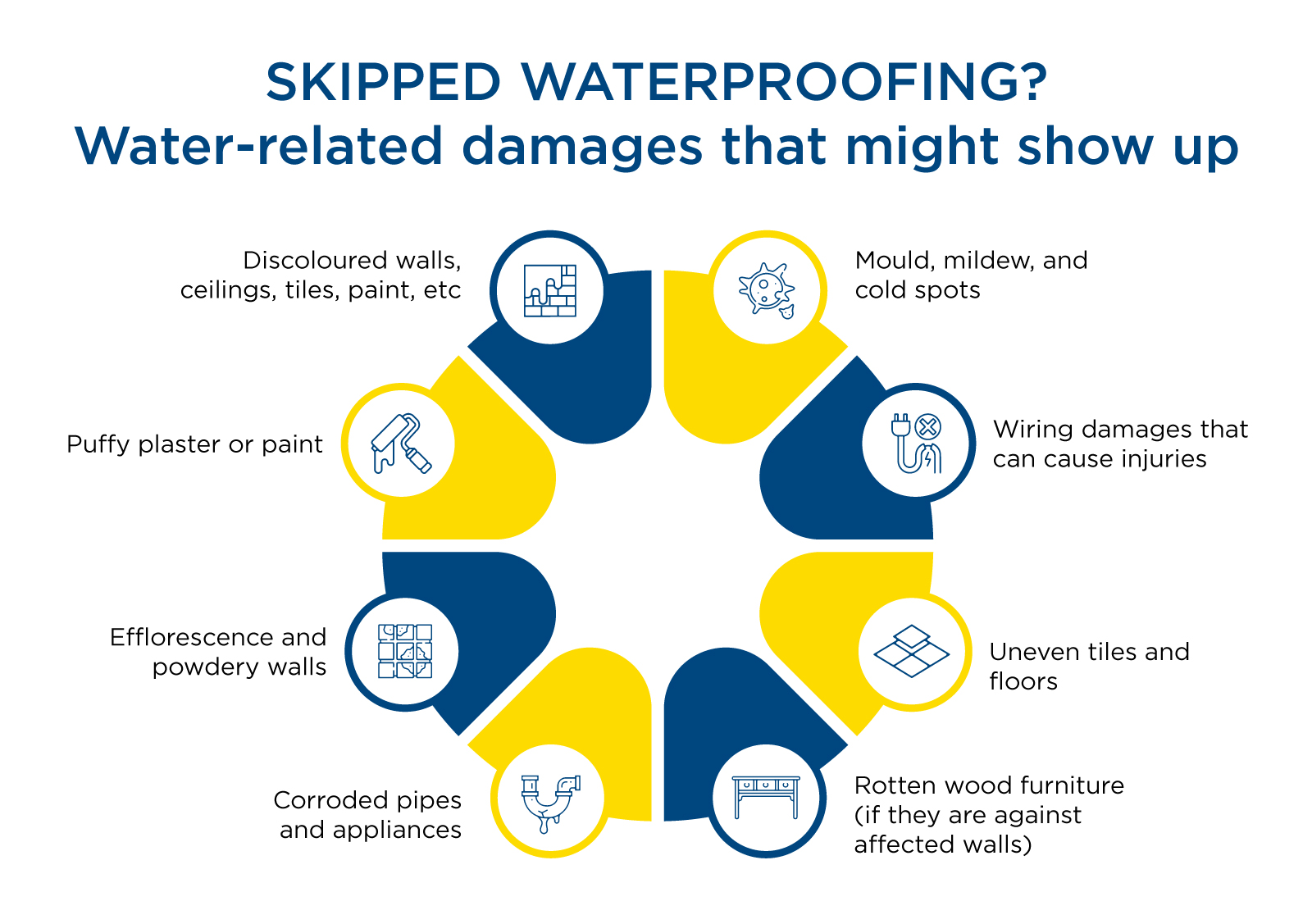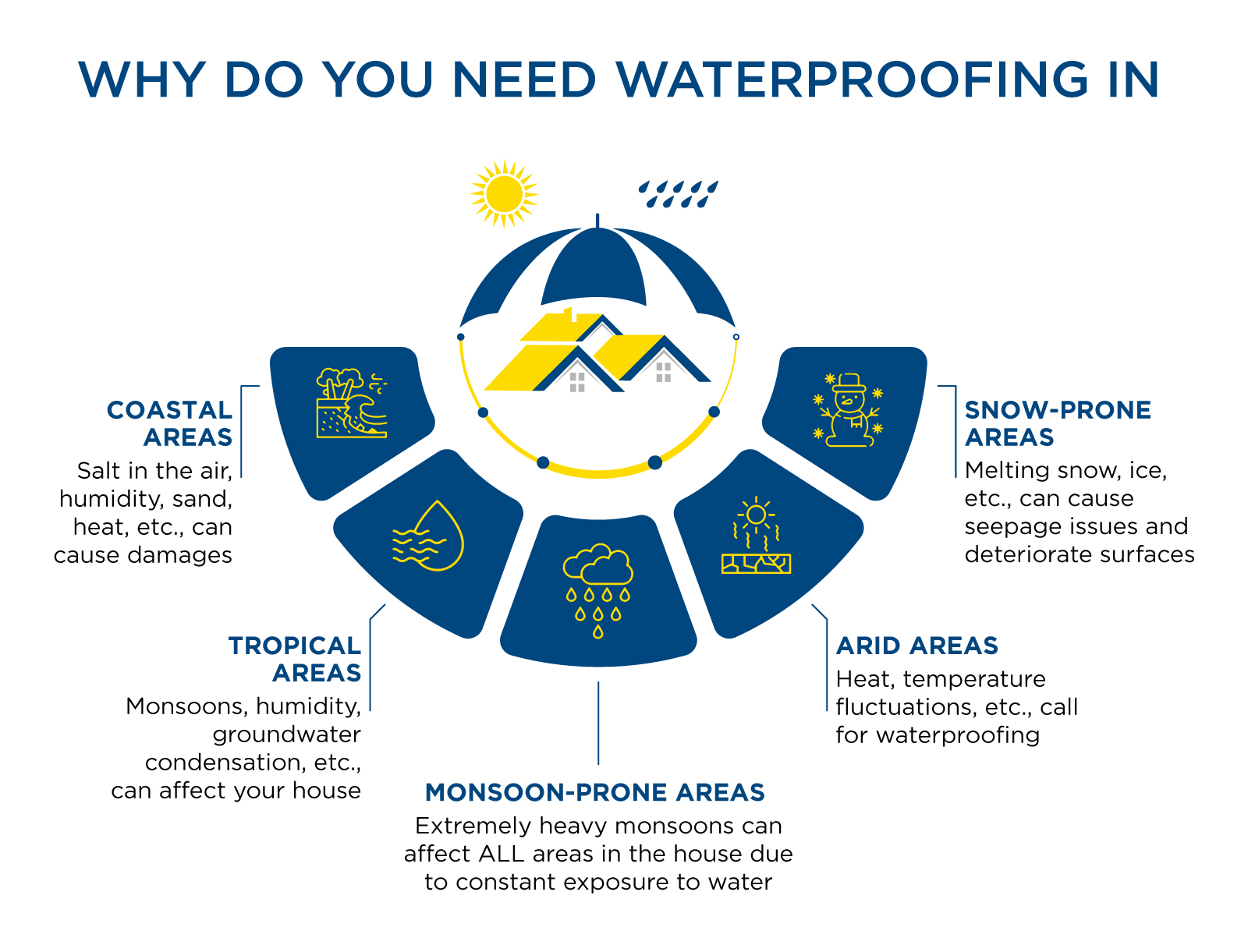
नवीकरण
Waterproofing: A comprehensive guide
Ensuring waterproofing is crucial for any home's stability, durability, and resillience. This comprehensive guide covers water-related damages, the importance of waterproofing, essential areas, and everything else you need to know.
Your house is not a mere structure, it is the result of your hard work, efforts, and dreams. However, this personal safe space needs extra attention to ensure its safety. Water infiltration can threaten this safety along with its beauty and integrity. This is when comprehensive waterproofing comes into the picture. It is your best defence to ensure your house remains as beautiful and sturdy as it was on day one.
Let us learn about waterproofing and its importance and explore how to shield your home from unwanted water intrusion.
What is waterproofing?
Waterproofing is a process of applying water-resistant materials to your house, shielding it from water intrusion and any related damages. It becomes exceedingly important because even a small leak can become dangerous as it can build up to weakening walls, roofs, and even the foundation.
Waterproofing creates a protective shield, especially in water-prone areas like bathrooms, kitchens, and roofs, enhancing the building's lifespan and ensuring a safer environment. If you have skipped this step during the construction phase you can still get your house waterproofed.
Why waterproofing is important?
While the primary objective of waterproofing is to prevent water seepage into your house, there are various other reasons you must know. These include -
1. Adds protection to the structure
By creating a strong barrier against water seepage, proper waterproofing prevents moisture from damaging essential elements of your home, such as walls, foundations, and roofs. Water in constant touch with these elements can lead to -
- Corrosion, rusting, and swelling, thereby affecting your home
- Cracks and gaps, thereby increasing the chance of building deterioration
2. Adds to property value
Waterproofing is essential for protecting property value. It keeps leaks, stains, dampness, mould, etc. out, maintains the building's strength, and saves money on repairs. This keeps the property strong and appealing to buyers, boosting its overall value.
3. Aids in preventing short-circuits/ accidents
Water seepage in electrical wires can result in short circuits, fires, and related accidents. Additionally, water can -
- Corrode metal components in electrical systems, rendering them inoperative
- Compromise insulating properties of equipment, leading to electrical hazards and accidents
However, prudent water leakage management minimises the risk of short circuits and other hazards.
4. Cost savings in the long run
Building or buying a house is an expensive affair. Without proper waterproofing, you are likely to spend significantly on frequent repairs and maintenance. This can affect your savings and disrupt your budget.
Water seepage can result in peeling paint, stains, warped surfaces, etc., thereby resulting in compromised aesthetics. It can also damage the furniture kept next to a damp wall. However, by deploying robust water leakage solutions, you can ensure that walls, ceilings, floors, etc., remain free from water-related issues, thus minimising repairs and refurbishments.
5. Helps lead a healthy life
Seepage can dampen walls, roofs, and other important areas of your home. Continuous dampness is a perfect breeding ground for mould and fungus that can affect the health of the residents. Prolonged exposure can lead to headaches, running nose, itchy eyes, skin ailments, etc., leading to long-term health complications.
Prudent roof leakage solutions coupled with wall dampness treatment help keep your home interiors dry and prevent the growth of fungus and mould, thus enhancing indoor air quality and leading to a healthier life.
What you must waterproof in your house
Now that you know why you must waterproof your house, let's learn about the areas that need waterproofing and why -
1. Roof waterproofing
This is one of the most widely waterproofed areas to prevent water seepage and water leakage. It involves applying specialised materials to the roof surface to create a barrier against moisture.
The advantages of roof waterproofing include -
- Protection against water and weather
- Prevents water seepage into the interiors
- Keeps the house cool
- Prevents small cracks and gaps that happen due to heat/water
2. Wall waterproofing
Internal and external wall waterproofing includes applying water-resistant materials, along with an exterior coating to the outer walls. It is primarily used as a wall dampness solution. Its advantages include -
- Protects exterior and interior aesthetics
- Prevents water seepage from the outside
- Prevents mould, stains, peeling of paint, etc.
3. Kitchen and bathroom waterproofing
The kitchen and bathrooms are prone to water-related issues due to their constant exposure to water. Kitchen and bathroom waterproofing is done to -
- Protect items like food, cosmetic products, medicines, etc., from contamination
- Prevent seepage to adjoining walls
- Prevent the areas from becoming slippery and causing accidents
4. Water tank waterproofing
Water tank waterproofing is applied to shield the tank from the damages that bulk water storage and constant water exposure can cause. It helps in -
- Keeping the water clean and safe to use
- Prevents seepage into adjoining walls
- Prevents gaps that can allow water in and out
5. Foundation waterproofing
This type of waterproofing can only be done during the construction of the house. It's important as it protects the foundation from groundwater exposure. Its other advantages include -
- Prevents rising water dampness
- Prevents efflorescence
Factors affecting the choice of waterproofing products
It is important that you hire a certified contractor to ensure high quality and proper waterproofing. However, having a basic knowledge of the products can save you from hasty work and ineffective waterproofing.
Waterproofing doesn’t follow a one-size-fits-all approach. Before proceeding with it, you need to consider the following factors -
1. Surface you want to waterproof
Different surfaces warrant different waterproofing. While kitchens and bathrooms require solutions that can resist wear and tear and constant exposure to water, surfaces like walls require solutions that can bear harsh weather, seepage, leakage, etc.
2. Climate you reside in
While tropical areas demand robust protection against heavy rainfall, arid regions require safeguarding against temperature fluctuations and heat. Understanding these climate-specific challenges ensures the selection of suitable waterproofing solutions to maintain the building and prevent any damage.
Banking on an expert for water leakage solutions
For effective waterproofing, it’s always better to choose an expert. While there are many solution providers, some essential considerations before you choose one include -
1. Expertise in identifying issues and providing the right solution
Quality waterproofing requires specialised skills to assess leakage and 'hidden' damages, among others. Your chosen waterproofing services provider company should have the expertise in identifying the issues and providing the right solutions.
2. Reputation in the domain
Opt for a company with a good reputation. Check out online reviews and customer testimonials to gauge the quality of services. Find out how long they have been in business, and if possible, speak to customers they have served to understand their working methodology.
Professional waterproofing solutions from Dr. Fixit
The right water leakage solution brings multiple benefits to the table. Whether you are constructing a new house, adding another floor to an existing one, or getting your apartment waterproofed, getting it right is of utmost importance.
With its extensive array of products, Dr. Fixit is a go-to expert for waterproofing products and solutions. To know more, you can fill out the form given below and reach out to our experts who will assist you in choosing the right solution and solve all your queries.
FAQs
#FAQ1 - When is the best time to waterproof your home?
The ideal time to carry out waterproofing is during construction. It will help you save money in the future since the foundation of your home has become secure.
On the other hand, if you have already constructed your home and are looking to waterproof it, the best time to do it is - as soon as possible. Before any damages show up, or existing ones escalate, reach out to an expert like Dr. Fixit.
#FAQ2 - Can I apply waterproofing solutions myself or should I hire an expert?
You should ALWAYS hire experts for waterproofing. This is because experts understand various waterproofing methods and know how to use the right one. Improper application can lead to inadequate protection and costly repairs in the future. Taking a DIY approach might also injure you in the process.
Before hiring, check the contractor's experience and talk to previous clients. Read online reviews to get better clarity.
#FAQ3 - How to prevent defects while implementing water leakage solutions?
Meticulous surface preparation is essential to prevent defects. Ensure proper cleaning, removal of debris, and repair of cracks. Select high-quality materials and, upon completion, perform regular inspections to address any signs of wear and tear, damage, and deterioration without delay.
Ensure your contractor follows the manufacturer's instructions while applying the solutions. It helps the materials to stick to the surface and offer a long-lasting solution. Diligent planning, thorough execution, and proactive maintenance are key to defect-free waterproofing.
Get Professional Waterproofing Solutions Today
Fill The Form below to took free site evaluation by Dr. fixit point safe painting service expert

